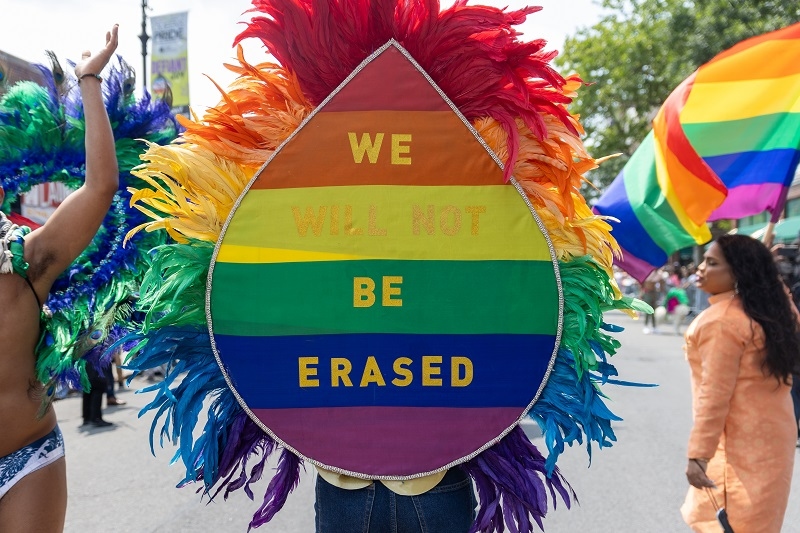Historic: Pope Approves Blessings For Same-Sex Couples

In a landmark decision, Pope Francis has approved the blessing of same-sex couples by Catholic priests. This decision marks a profound shift in the Catholic Church's approach towards LGBTQ+ relationships, reflecting a broader trend of modernization and inclusivity under Pope Francis's leadership.
The move not only challenges the traditional views held by the Church but also represents a significant step towards reconciling faith with the personal lives of its diverse followers. Let us learn more.
Background and Context
Historically, the Vatican has upheld a strict doctrine regarding marriage, emphasizing that it should be between a man and a woman. This stance has extended to a categorical rejection of same-sex marriages and relationships. However, the tone began to shift notably under Pope Francis's papacy.
In 2021, the Vatican issued a controversial statement explicitly opposing the blessing of same-sex unions, citing that "God cannot bless sin." This statement sparked global debate and highlighted the internal and external pressures facing the Church regarding its stance on LGBTQ+ issues.
In response to growing dissent and the need for a more inclusive church, Pope Francis has taken progressive steps to bridge the gap between doctrine and the realities of modern believers. His actions and words have gradually paved the way for greater acceptance and support within the Church for LGBTQ+ individuals.
The Vaticans New Directive

Recently, the Vatican introduced new guidelines that officially allow the blessing of same-sex couples. This directive clarifies that while these blessings are sanctioned, they should not be confused with the sacrament of marriage, which the Church still reserves for heterosexual couples. The guidelines emphasize that the blessings are meant to foster a relationship with God and are offered without demanding moral perfection from those seeking them.
This development underscores a significant doctrinal shift, aiming to extend the Church's pastoral care to all faithful, regardless of their sexual orientation. To support this inclusive initiative, it is also crucial to address the specific needs of marginalized groups, such as improving mental health in Transgender Women, within the church's broader pastoral care.
Reactions and Implications
The reaction to the Vatican's new policy has been mixed, reflecting a spectrum of beliefs within the Church. Conservative factions within the Church have expressed dismay, viewing the move as a departure from traditional Catholic teachings. On the other hand, LGBTQ+ advocacy groups, while welcoming the change, continue to advocate for further reforms. Prominent figures like Francis DeBernardo and Rev. James Martin have lauded the decision, emphasizing its importance in making the Church a more inclusive space for all worshippers.
Globally, the response has also varied significantly, particularly in regions with stringent anti-LGBTQ+ laws. In such places, the Church's new stance could serve as a beacon of hope and potentially influence broader societal changes toward greater acceptance of LGBTQ+ individuals.
Personal Stories and Testimonies
The recent Pope's same sex couples blessing decision has had a profound impact on individuals like Javier Lpez and Sergio Guzmn. Their story, which unfolded unexpectedly in Mexico, highlights the deep emotional resonance such blessings can carry. After receiving an unsolicited blessing from a priest who was a longtime family friend, Lpez and Guzmn experienced a moment of unexpected affirmation that underscored the Church's evolving approach to inclusivity.
For many LGBTQ+ Catholics and their families, these blessings represent a significant step towards acceptance and recognition within their faith community, offering a sense of belonging and spiritual validation that was previously denied. This movement towards inclusivity is further enhanced by embracing concepts like gender affirmation, which acknowledges and supports the identity and experiences of all church members.
Operational Challenges and Clergy Perspectives
Implementing the new policy on blessings for same-sex couples presents various operational challenges. Priests now have discretionary power to administer these blessings, which can vary significantly in execution depending on individual beliefs and the local community's attitudes.
Father Chris Ponnet, a chaplain to the gay and lesbian ministry in the Archdiocese of Los Angeles, emphasizes the need for clarity in these blessings. He advocates for a clear understanding that the Church is blessing the individuals and their quest for faithfulness rather than their relationship status. This distinction is crucial for maintaining doctrinal consistency while extending pastoral care.
Comparative Analysis
Comparing the Catholic Church's stance to other denominations and religions reveals a spectrum of approaches towards same-sex unions and blessings. For instance, the Church of England has initiated discussions about more inclusive practices, reflecting a broader trend of progressive religious responses globally.
Some Protestant denominations have already embraced LGBTQ+ rights more fully, conducting marriages and blessings without distinction. In contrast, many conservative faiths remain steadfast in their traditional views, highlighting the diverse theological interpretations that exist across and within religions.
You may also like: A Comprehensive Guide To Same-sex Marriage In The US
Looking Ahead
The journey of the Catholic Church towards inclusivity and acceptance is ongoing. The Catholic blessing of same sex couples represents a significant shift towards inclusivity in the Church. With Pope Francis's endorsement of blessings for same-sex couples, the Church is taking measurable steps towards reconciling its teachings with the realities of modern followers' lives. This development not only fosters greater unity within the Church but also challenges it to continue its dialogue and understanding about faith in the contemporary world.
As the Church navigates these complex issues, the call for continued dialogue and an open-hearted approach to diverse experiences remains crucial. This adaptive journey is not just about doctrinal shifts but about enriching the spiritual lives of all believers, ensuring that the Church remains a supportive and inclusive community for everyone.
This content was created by AI


























